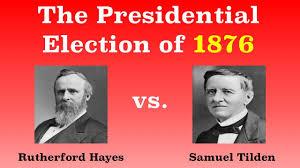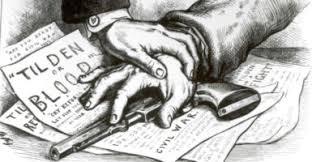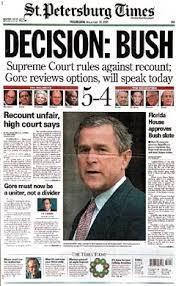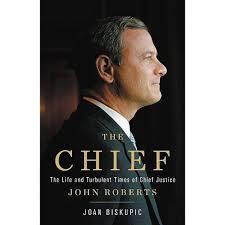In college I wrote a paper on the disputed 1876 election — a unique case in our history. Which I never thought I’d see reprised.

President Grant, after two terms, did not run again. The Democratic nominee, Samuel Tilden (New York’s reformist governor) won a clear popular vote majority over the Republican Rutherford Hayes. But three southern states submitted different sets of electoral votes, certified by rival state officials. One Oregon electoral vote was also disputed. The southern story was largely a consequence of post-Civil War reconstruction, and electoral chaos, with ex-slaves voting and white efforts to suppress that. (Since most Blacks voted Republican, Hayes would probably have won a fair election.)
The Constitution says Congress counts the electoral votes, but the exact procedure, in case of disputes, was unclear. Needless to say, the situation created an uproar. Congress set up a 15-member “Electoral Commission,” to resolve it, designed to have seven members from each party, including two Democratic and two Republican Supreme Court justices who would choose the 15th member, presumably neutral. Long story short, it didn’t work out that way, and the Commission awarded all 20 disputed electoral votes to Hayes — giving him victory, 185-184.

Democrats felt cheated, and there were threats of not accepting Hayes as president. But as inauguration day loomed, the two parties made a deal. Hayes would become president, and in return, federal troops would be removed from the South. Effectively putting white Democrats back in power.
Tilden expressed satisfaction at having had the honor of being elected president while escaping the burdens of office.

In the 2000 election one state’s ballot counting (and hence who won the electoral vote) was contested. There was talk of rival electoral vote submissions like in 1876 (triggering Sec. 15), but before it got to that the Supreme Court resolved the matter. Some did call it a partisan decision, a stolen election. However, it’s impossible to know who “really” won; and had the Court decided the other way, that wouldn’t have given the election to Gore. Instead, the matter would have been thrown back to Florida and into further turmoil, with the path ahead very murky.
Immediately after the decision, Gore made an extremely gracious speech conceding the election without reservations. That helped to persuade his supporters to accept the outcome. And peace did reign in the land. But actually, nobody expected otherwise at the time, even though we did have serious partisan divisions.
In 2020 there is the specter of another 1876, with disputed electoral votes. An unusually high proportion of popular votes will be cast by mail; likely most for Biden. They will be counted after November 3, with a December 14 deadline for certifying presidential electors. The apparent Republican plan is to disrupt that count as much as possible, throwing up baseless fraud claims, so that in swing states with legislatures they control (thanks to gerrymandering), those legislatures can take over and simply appoint Trump presidential electors. The Constitution does not actually say electors must be chosen by popular vote.
But there is a safeguard against that plan. After the 1876 mess, a law (3 U.S. Code Sec.15) was enacted specifying how electoral votes are to be counted. Congress — the new one, in January — can reject electoral votes, if both chambers agree. The House will be Democratic. It’s increasingly likely the Senate will too. Though it’s conceivable that blocking the count of mail ballots could also prevent some Democratic Senators being seated.

Republicans will also employ litigation, aiming to somehow have the election ultimately decided — as in 2000 — by the Supreme Court, which they control. In the past I would not have used those words, strongly defending the Court’s nonpartisan integrity. And I might have trusted Chief Justice Roberts to do the right thing and avoid having the Court’s credibility destroyed by ratifying a blatant election theft. But I’ve just read Joan Biskupic’s Roberts biography, and now I’m not so sure. I fear Roberts is too limited a man to see the picture largely enough, and might rule on some narrow theory of not interfering with state election machinery (as though that’s steering clear of politics). Furthermore, the Court will soon have five other members (out of nine) apt to side with Republicans.

This whole nightmare may be avoided with a decisive Biden victory. But if Republicans can win by stealing just one or two states, they probably will try; if more is needed, it will likely be a bridge too far. Then Trumpsters can accuse me of crying wolf here. Fine. I’d love it if this wolf never arrives.
The country did peacefully accept the outcome in 1876; and in 2000. But it’s a very different nation today, with divisive political feelings far more intense. And impervious to reason, as evidenced by 40% still supporting Trump, in spite of everything. November’s turmoil will put American democracy to an unprecedented stress test. Can it survive this? Or will it finally become the sham democracy that cynics have long called it? With — as in many autocracies today — democratic theater without democratic reality?
No matter how big the vote against him, Trump will refuse to concede, will continue waging media war crying fraud, and millions will believe him, not peaceably accepting the outcome. Many have guns and are busting for the chance to prove their “patriotism.” We’ve just seen a foiled plot by domestic terrorists to kidnap Michigan’s governor and seize control of the state. This was not some joke, it might well have resulted in a very bloody rupture of our civic fabric. And there are surely more where those Michigan plotters came from. Trump, tacitly encouraging them, is playing with fire. After November 3, it may be more than tacit. Buckle your seat belts.

And what if Trump’s putsch succeeds? Will Democrats accept it? I will not. What will I do? I don’t know. I believe in not crossing bridges till you get to them. I still hope this is one I won’t have to cross.
